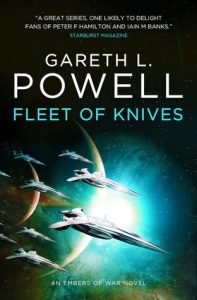Embers of War & Fleet of Knives by Gareth L. Powell (Book Review)
Since I read the books and started this review, Embers of War has won the BSFA Award for best novel, so this is both a timely (and perhaps redundant) review. But, if you are wondering what the fuss is all about, I hope it gives a bit of an indication…
I first encountered Gareth L Powell through Bristolcon and Twitter (not sure in what order), and then through his wonderful Ack-Ack Macaque series. If you haven’t read it, it’s about the adventures of a cigar-chomping, Spitfire-piloting, genetically-modified monkey through a steam/diesel/wire-punk alternative near-future. (Yes, it’s just as amazing as it sounds.)
So obviously, when I heard he had a new space opera trilogy coming out, I didn’t wait long to pick up Embers of War, and then jumped at the chance to review the sequel. Though I mainly read fantasy (and though this is mainly a fantasy site), I do read the younger spec fic genre from time to time – and now apparently review it. Since the books are so closely intertwined, this will basically be a (non-spoilery) review for the series so far.
 Science fiction has been in the news recently, and whatever you think of more mainstream authors writing and commenting on genre fiction, when there are authors like Gareth L Powell working in science fiction, I don’t think it needs any help. Yes, there are spaceships “travelling 10 times the speed of light” and maybe even some gravity boots, but what’s so great about these books – as with many others – are the characters.
Science fiction has been in the news recently, and whatever you think of more mainstream authors writing and commenting on genre fiction, when there are authors like Gareth L Powell working in science fiction, I don’t think it needs any help. Yes, there are spaceships “travelling 10 times the speed of light” and maybe even some gravity boots, but what’s so great about these books – as with many others – are the characters.
And one of the most memorable characters is the spaceship herself, Trouble Dog.
Trouble Dog is an ex-warship that has resigned her commission and gone to work for the House of Reclamation (like a galactic version of Thunderbird’s International Rescue, without all the gadgets). And yes, I said “resigned her commission”, because Trouble Dog is sentient. Not just an AI, her organic core is the combination of a war hero and an actual canine, giving her a unique perspective on her place in the universe – and an occasional bad(ass) attitude.
Nor is she the only compelling character in these multi-POV books, most of whom, like Trouble Dog, are recovering – or running – from the scars of war. This includes ex-military captains Sal Konstanz and Ona Sudak, from different sides of the recent conflict, and dealing with it in (vastly) different ways. We also get to see inside the heads of wantaway spy Ashton Childe (book 1) and wannabe Han Solo “Lucky” Johnny Schultz (book 2), caught up in events that are perhaps too big for them.
And there’s also Trouble Dog’s alien engineer, Nod the Druff, who manages to come across as both adorably grumpy and endearingly devoted in very few words. The non-POV characters have their roles to play as well, though the nature of the action means not all of them survive.
These are all damaged people, as you’d expect from those coming out of a galactic war only settled by an unforgivable atrocity. They aren’t necessarily the people you’d want the fate of humanity to depend on, either – they aren’t Starfleet, or Jedi, or Avengers – but watching them grapple with situations far above their pay grade is exactly what makes the books so compelling. And if they don’t always make the right choices, or have the right answers, their hearts are in the right place (well, most of them anyway).
Plot-wise, things start somewhat small – with a botched rescue and an attack on a space-liner – and builds layers of mystery, conspiracy, and threat. There are hints of yet another layer of ramping up to come in the third book, too. And yet it always comes back to the characters, and the choices they make situation-by-situation. Personal stakes of survival and restitution draw our cast to the epicentre of a galactic revelation, and then (in book two and presumably three) a confrontation that threatens life as we know it.
 Commendably, the books manage to contain this galaxy-spanning plot in a compact, focused package. Each book has a building crescendo of action, tension, and pace, all delivered with snappy dialogue and honed prose. Short chapters rotate around different POVs without ever stalling the momentum. You never have to wait long to get back to any particular thread, and the threads converge quite quickly, focusing the story despite the shifting perspective.
Commendably, the books manage to contain this galaxy-spanning plot in a compact, focused package. Each book has a building crescendo of action, tension, and pace, all delivered with snappy dialogue and honed prose. Short chapters rotate around different POVs without ever stalling the momentum. You never have to wait long to get back to any particular thread, and the threads converge quite quickly, focusing the story despite the shifting perspective.
Such is the impression of pace, that it almost feels as if the whole trilogy could fit in one volume. I was stunned to discover both are over 400 pages – the way they race along, it almost seemed half that! The other reason for this is that they are very connected books, a tight trilogy rather than a looser sequence. While the first finishes at a satisfying conclusion, there’s really no question you have to read the second ASAP. This isn’t due to anything so trite as cliff-hangers, but because of the huge questions that remain unanswered. It’s even more so with the second, which rapidly expands the galactic stakes and doesn’t come close to resolving them. The third book has a lot to pay off, and while Trouble Dog and her crew may not come out unscathed (they haven’t so far!), they can be counted on to face down the threat with the dogged determination we’ve come to admire.
Overall, I probably prefer the all-out zaniness of Ack-Ack Macaque, but for anyone looking for a consummate, modern space opera, I can heartily recommend Embers of War. These are really well-crafted books, written by someone hugely comfortable in the genre – which seems like damning with faint praise, but I mean it with great respect. They read like Becky Chambers’ The Long Way to a Small Angry Planet meets The Expanse – with some trademark Powell snark – and while the series is perhaps not quite as boundary-pushing as Ann Leckie’s Ancillary books or Kameron Hurley’s The Stars Are Legion, they are hugely enjoyable, expertly written, and effortlessly compelling.
I can’t wait to read the next one.
